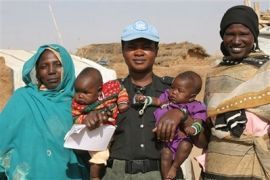UN police into Darfur refugee camp
January 28, 2008 (ABOU SHOUK) — Two refugee mothers handed their babies to a U.N. police officer and squeezed in for a picture. Nearby, other officers helped women fill jugs of water.
 The friendly scenes — unthinkable just a few weeks ago because of the refugees’ hostility toward ineffectual African Union peacekeepers — show that a new joint force is having some initial success helping Darfur’s volatile camps. But top U.N. officials warn the operation could ultimately fail without more troops and equipment.
The friendly scenes — unthinkable just a few weeks ago because of the refugees’ hostility toward ineffectual African Union peacekeepers — show that a new joint force is having some initial success helping Darfur’s volatile camps. But top U.N. officials warn the operation could ultimately fail without more troops and equipment.
An Associated Press reporter was the first international journalist to see the interactions between the new U.N.-African Union force and refugees in the camps this week. Made up of police officers and military troops, it began deploying in Darfur in January, returning peacekeepers to the refugee camps for the first time in months.
“The color of the beret and the new mandate has changed it all,” said U.N. police Superintendent Eze Emmanuel of Nigeria, proudly pointing at his new blue beret — the color of U.N. peacekeepers worldwide — which replaced the African Union’s green berets.
Although African Union peacekeepers first arrived in Darfur more than two years ago, the refugees’ distrust of the overwhelmed force made Abou Shouk and most other refugee camps off-limits to the peacekeepers.
Abou Shouk’s 90,000 inhabitants were left alone in a maze of mud huts on the outskirts of El Fasher, the capital of North Darfur.
The refugees lived in constant fear of bloody attacks, rape and harassment by the janjaweed, an Arab militia the Sudanese government is accused of arming and funding to fight ethnic African rebels in Darfur. More than 200,000 people have died in the vast region of western Sudan in five years of fighting. The Sudanese government denies supporting the janjaweed.
Crime inside Abou Shouk also soared, and with the under-equipped, understaffed African Union force incapable of stopping the violence, many refugees grew to view the peacekeepers as biased in favor of the Khartoum government. The unarmed AU troops were often attacked, ambushed or chased out of many refugee camps.
After months of negotiations, a joint U.N.-African Union force, called UNAMID, officially took over the reins in Darfur on Jan. 1, largely incorporating the previous African peacekeepers. It has made securing the camps its first priority.
The mission is resuming at least two daily, unarmed patrols throughout Darfur’s camps, said Superintendent David Eklu, of Ghana. “We’re building up to have a 24/7 presence,” he said.
But barely 1,400 of UNAMID’s planned 6,000 police officers are in Darfur, and Bangladesh is the only contributing nation to have sent a new contingent so far. More urgently, the mission has only 7,000 troops instead of the expected 20,000, and wealthy Western countries are balking at offering crucial equipment such as helicopters.
With so many troops and gear still missing, “we can only fulfill some of the mandate of UNAMID,” Gen. Martin Agwai, the force commander, told the AP last week.
Fighting erupted in Darfur in 2003 when ethnic African rebels took up arms against the Arab-dominated central government, accusing it of discrimination. The central government in Khartoum is accused by human rights groups and others of retaliating with widespread atrocities against civilians, largely ethnic Africans, about 2.5 million of whom fled to refugee camps.
The government denies the allegations.
For now, the U.N. patrols seem more geared at warming up to refugees than tackling crime in the camps. Officers were seen strolling around, shaking hands and holding discussions with camp elders. Eklu said this was part of a “confidence-building strategy.”
“I know it’s basic, but it shows we’re here to help them. We’re humans like them, we feel the pain,” he said as one police officer helped a woman load a large plastic barrel of drinking water on her head. “We want them to identify our faces and our names, to know us.”
At a later stage, there are plans to resume missions known as “firewood patrols” when police accompany women refugees to protect them from rape by armed militia members when they leave the camp to collect wood for cooking.
Eklu, the police superintendent, said the peacekeepers also hope to launch community policing in the camps and teach Sudanese police and rebels to “respect human rights and the rule of law.”
Agwai, the U.N. force commander, said one of the biggest challenges will be to manage the refugees’ high expectations with the force’s meager capacity. But time is limited, he said.
He estimates the refugees will probably tolerate current levels of violence and insecurity for a little while as the U.N. builds up its presence. But he fears a “volcanic eruption” against the mission if any atrocities take place and Darfur civilians feel the U.N. has failed to protect them.
Abou Shouk’s refugees are overwhelmingly loyal to rebel chief Abdulwahid Elnur, the exiled leader of one of the main Darfur rebel factions. When Elnur expressed support for the new U.N. force, local sheiks here said they also welcome the blue berets.
Agwai pleaded for the refugees to be patient as he tries to muster more peacekeepers.
“If they’ve waited five years, they could wait for another five months,” Agwai said. “And definitely, they will begin to see changes on the ground.”
In Abou Shouk, Omda Hussein Itzakh, a traditional tribal chief, eyed peacekeepers uneasily as they chatted with Sudanese police at the camp’s entrance. But he said he welcomed the peacekeepers’ return nonetheless.
“We know they’re our last chance, so we hope they’re serious about helping us,” he said.
(AP)
